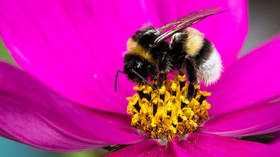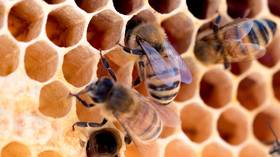Bees are fish, US court declares

Four species of bumblebees have been reclassified as ‘fish’ in the state of California so that they can be protected under its Endangered Species Act, a court ruled on Tuesday, reversing a 2020 ruling and affirming that the term ‘fish’ shouldn’t be confined to merely ‘aquatic’ invertebrates under the law.
“We acknowledge the scope of the definition is ambiguous but also recognize we are not interpreting the definition on a blank slate,” the California Court of Appeal for the Third District declared in its ruling.
The four species of bumblebees are now protected by the California Fish and Game Commission as at-risk plants and animals, sheltering the insects from import, export, possession, purchase, or sale. The move is a blow to agricultural groups, in particular the Almond Alliance of California, which has lashed out against the ruling, arguing it would further financially burden growers of the crop who use pesticides known to harm bees.
Because insects are not a protected category under the California Endangered Species Act (CESA), the agency had to get creative. Candidates for CESA protection are limited to “a native species or subspecies of a bird, mammal, fish, amphibian, reptile, or plant” under California’s fish and game laws. While some species of insect are protected in the state, they fall under the federal Endangered Species Act.
The agency opted to split biological hairs in order to save the bees, noting the legal definition of fish – “a wild fish, mollusk, crustacean, invertebrate, amphibian, or part, spawn, or ovum of any of those animals” – includes invertebrates, which includes bumblebees.
While the trial court dismissed their claim, the appellate court countered that bees could in fact qualify as fish, because “although the term fish is colloquially and commonly understood to refer to aquatic species, the term of art employed by the Legislature in the definition of fish… is not so limited.”
The decision pointed out that a snail had previously been listed under CESA, noting that because such a terrestrial invertebrate “could have qualified as such only within the definition of fish,” the Commission’s authority was not limited to listing only aquatic invertebrates.
“Accordingly, a terrestrial invertebrate, like each of the four bumble bee species, may be listed as an endangered or threatened species under the Act,” the ruling stated. “The legislative history supports the liberal interpretation of the Act (the lens through which we are required to construe the Act) that the Commission may list any invertebrate as an endangered or threatened species.”
The newly-protected species include Crotch, Franklin, Suckley, and Western bumble bees. They are “highly endangered,” according to the Xerces Society for Invertebrate Conservation, whose spokeswoman, Sarina Jepsen, argued that classifying the critical pollinators as endangered is essential to their survival.
The California Endangered Species Act protects about 250 species of plant and animal. However, it doesn’t cover insects, theoretically leaving bumblebees in a legal no man’s land. Over the years, the definition of fish has slowly been expanded to include amphibians and later invertebrates in general, opening the door to the inclusion of bees.













